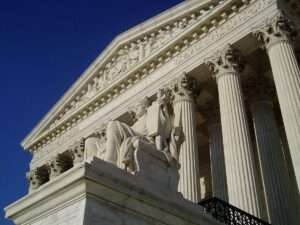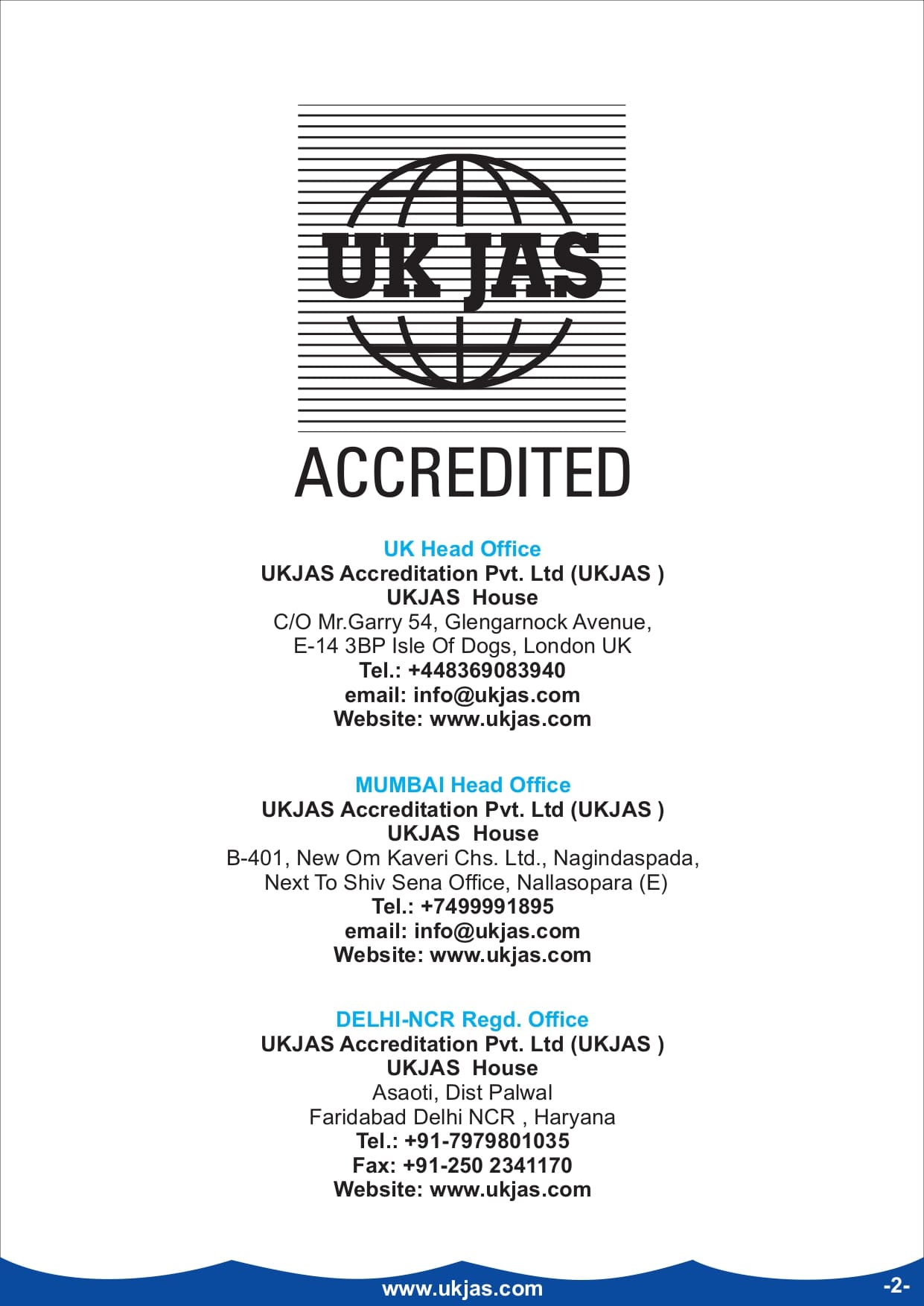UKJAS Accreditation Pvt. Ltd.

UKJAS AUTHORITY
The power vested in Certification Administration for Guaranteeing Bodies LLC (UKJAS) is
that appointed to them by the client similarity evaluation body and by the association in
regard of the certification administrations contracted.
UKJAS is gladly liberated from political obstruction and they offer their types of assistance
with no consolation, backing, endorsement or permit from some other legal or government
office of any country or state.
No case as to legal, authoritative, authority, conspicuousness or right given by some other
party except if indicated by UKJAS is asserted.
UKJAS certify associations supply administrations to nearby and public legislatures around
the world. UKJAS would encourage all closely involved individuals to check the adequacy
of any certification plot with their clients.
References
[edit]- ^ Bealey, Frank (1999). The Blackwell Dictionary of Political Science: A User’s Guide to Its Terms. Wiley. pp. 22–23. ISBN 0-631-20694-9.
- ^ Miller, David (26 June 2003). “Political authority”. Political Philosophy: A Very Short Introduction. Very Short Introductions. Oxford: Oxford University Press. p. 20. ISBN 9780191577864. Retrieved 28 September 2024.
Political authority has two sides to it. On the one side, people generally recognize it as authority, in other words as having the right to command […] On the other side, people who refuse to obey are compelled to do so by the threat of sanctions […]. And these two aspects are complementary.
- ^ Jump up to:a b The New Fontana Dictionary of Modern Thought Third Edition, Allan Bullock and Stephen Trombley, Eds. p. 115.
- ^ Covell, Charles (9 July 2009). “Rousseau, Kant and Hegel”. The Law of Nations in Political Thought: A Critical Survey from Vitoria to Hegel. Basingstoke: Palgrave Macmillan. ISBN 9780230244450. Retrieved 28 September 2024.
[According to Kant, the] juridicial order of civil society found its concrete institutional embodiment in the civil state, as through the legislative, executive and judicial authorities that comprised the basis of the state constitution and the system of state government. Of the three state authorities, the legislative authority was understood by Kant to be foundational in that it stood as the sovereign authority in the state […].
- ^ The New Fontana Dictionary of Modern Thought, Third edition, Allan Bullock and Stephen Trombley, eds., pp. 677–678.
- ^ Widyono, Benny (Oct 2014). “United Nations Transitional Authority in Cambodia (UNTAC)”.
- ^ Krause, George A. (2010). Durant, Robert F. (ed.). “Legislative Delegation of Authority to Bureaucratic Agencies”. The Oxford Handbook of American Bureaucracy. New York: Oxford University Press. p. 524.
- ^ Glanville, Luke (2016). Bellamy, Alex J. (ed.). “Sovereignty”. The Oxford Handbook of the Responsibility to Protect. New York: Oxford University Press. p. 153.
- ^ Laitin, David (1998). “Toward a Political Science Discipline: Authority Patterns Revisited”. Comparative Political Studies. 31 (4): 423–443. doi:10.1177/0010414098031004002. S2CID 146736449.
- ^ Cristi, Renato (2005). Hegel on Freedom and Authority. Cardiff, Wales: University of Wales Press.
- ^ Anthony Giddens, Sociology. London: Polity Press, 1997:581
- ^ Max Weber in “Weber’s Rationalism and Modern Society: New Translations for the 21st Century”, translated and edited by Tony Waters and Dagmar Waters. pp. 137-138.
- ^ C. Naomi Osorio-Kupferblum: “Conceptualising ‘Authority’”. In: International Journal of Philosophical Studies. Vol. 23, No. 2, 13 March 2015, pp. 223–236, doi:10.1080/09672559.2015.1020828
- ^ Bloom, Howard (2010). The Genius of the Beast: a radical re-vision of capitalism. Amherst, New York: Prometheus Books. p. 186. ISBN 978-1-59102-754-6.
To validate an argument, we refer back to our ancestors – or to someone who, while still alive, has already garnered the sort of authority only ancestors normally have.
- ^ Max Weber in Weber’s Rationalism and Modern Society, translated and edited by Tony Waters and Dagmar Waters, Palgrave Books 2015, pp. 136 [ISBN missing]
- ^ TY – CHAP AU – Guzman, Sebastian PY – 2007/02/01 SP – 1 EP – 2 N2 – Rational legal authority is a concept developed by Max Weber (1864–1920) to explain the stability of domination in modern times, especially in bureaucracies and democracies. A ruler is or has rational legal authority when she is perceived as legitimate by her subjects on the grounds that she has been given rights to issue commands by formal rules or laws. This entry defines the concept in relation to Weber’s more general understanding of domination and other types of legitimate domination, explains the usefulness of the concept from a Weberian perspective, and presents some of the main criticisms of the concept. T1 – Rational Legal Authority DO – 10.1002/9781405165518.wbeosr026.pub2 ER –
- ^ Flemisch, F., Heesen, M., Hesse, T., Kelsch, J., Schieben, A., & Beller, J. (2011). Towards a Dynamic Balance between Humans and Automation: Authority, Ability, Responsibility and Control in Cooperative Control Situations. Cognition, Technology and Work. Advance online publication. doi:10.1007/s10111-011-0191-6
- ^ Ludeke, Steven; Johnson, Wendy; Bouchard, Thomas J. (2013-08-01). ““Obedience to traditional authority:” A heritable factor underlying authoritarianism, conservatism and religiousness”. Personality and Individual Differences. 55 (4): 375–380. doi:10.1016/j.paid.2013.03.018. ISSN 0191-8869.
- ^ Laupa, 1991.
- ^ Reinhard. Bendix. Max Weber: An Intellectual Portrait. Garden City, NY: Anchor Books, Doubleday & Company, Inc. 1960.
- ^ “Country Comparison”. Hofstede Insights. 21 Jun 2021. Retrieved 3 Nov 2021.
- ^ “The Declaration of Independence”. Archived from the original on 2009-08-02. Retrieved 2009-07-27.[full citation needed]
- ^ Jump up to:a b c Guelzo, Allen C. (2012). Lincoln Speeches. New York: Penguin Books.
- ^ Jump up to:a b Ferejohn, John (2004). “The Authority of Regulation and the Control of Regulators”. In Marie-Anne Frison-Roche (ed.). Droit et économie de la régulation. Cairn.info. pp. 35–37. ISBN 9782724686463. OCLC 7292576035. Archived from the original on October 3, 2020 – via archive.today/IA9DF archive.is.
Further reading
- Noh, State of Exception (2005)
- Hannah Arendt, “Authority in the Twentieth Century.” Review of Politics (1956)
- Hannah Arendt, On Violence (1970)
- Józef Maria Bocheński, Was ist Autorität? (1974)
- Renato Cristi, Hegel on Freedom and Authority (2005)
- Carl Joachim Friedrich, Authority. Cambridge, MA: Harvard University Press (1958)
- Carl Joachim Friedrich, An Introduction to Political Theory: Twelve Lectures at Harvard. New York: Harper & Row (1967)
- Carl Joachim Friedrich, Tradition and Authority. London: Macmillan (1972)
- Robert E. Goodin (ed), The Oxford Handbook of Political Science (2011)
- Sebastian De Grazia. (1959). “What Authority Is Not“. American Political Science Review 53(2): 321–331.
- Patrick Hayden, Hannah Arendt: Key Concepts (2014), esp. Chapter 8
- Alexandre Kojève, “The Notion of Authority” (2014)
- C. Naomi Osorio-Kupferblum: “Conceptualising ‘Authority’“. In: International Journal of Philosophical Studies. Vol. 23, No. 2, 13 March 2015, pp. 223–236, doi:10.1080/09672559.2015.1020828
- Gail Radford, The Rise of the Public Authority: Statebuilding and Economic Development in Twentieth-Century America (2013)
- Rosen, Arie (2023). “Political Reasons and the Limits of Political Authority.” Legal Theory 29 (1): 63–88.
- Carl Schmitt, Der Begriff des Politischen [The Concept of the Political] (1932)
- Max Weber, Economy and Society (1922)
- Max Weber, Politics as a Vocation (1919)

UK Head Office
UKJAS Accreditation Pvt. Ltd (UKJAS )
UKJAS House
C/O Mr.Garry 54, Glengarnock Avenue,
E-14 3BP Isle Of Dogs, London UK
Tel.: +448369083940
email: [email protected]
Website: www.ukjas.com
MUMBAI Head Office
UKJAS Accreditation Pvt. Ltd (UKJAS )
UKJAS House
B-401, New Om Kaveri Chs. Ltd., Nagindaspada,
Next To Shiv Sena Office, Nallasopara (E)
Tel.: +7499991895
email: [email protected]
Website: www.ukjas.com
DELHI-NCR Regd. Office
UKJAS Accreditation Pvt. Ltd (UKJAS )
UKJAS House
Asaoti, Dist Palwal
Faridabad Delhi NCR , Haryana
Tel.: +91-7979801035
Fax: +91-250 2341170
Website: www.ukjas.com
Branches

